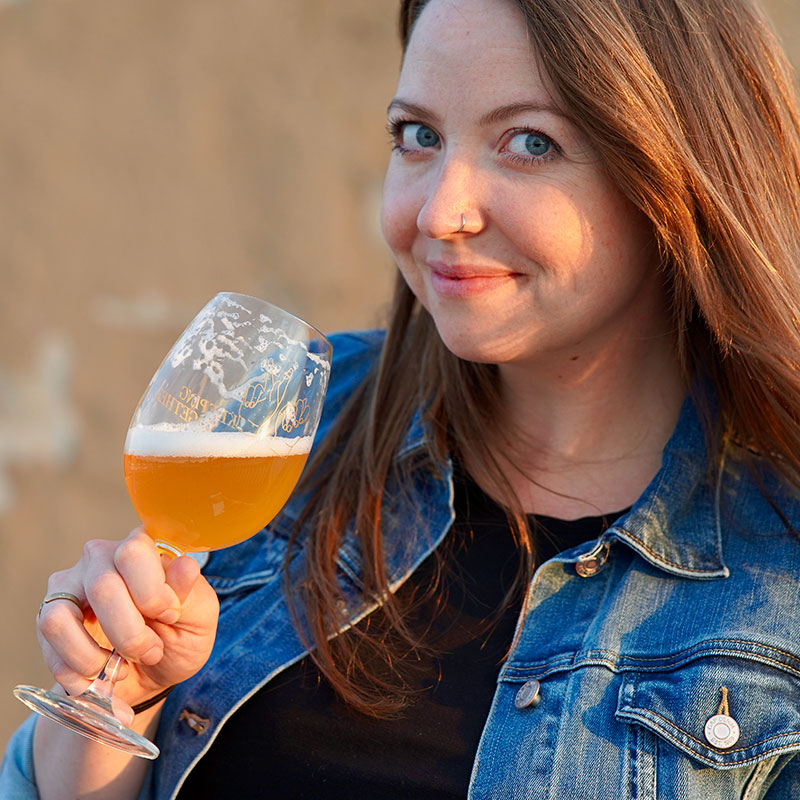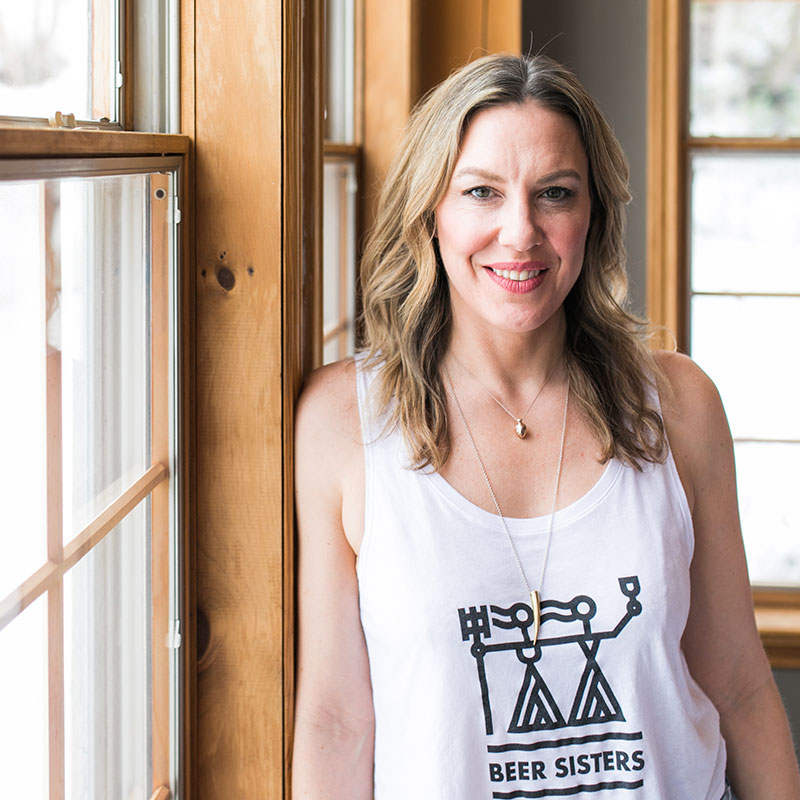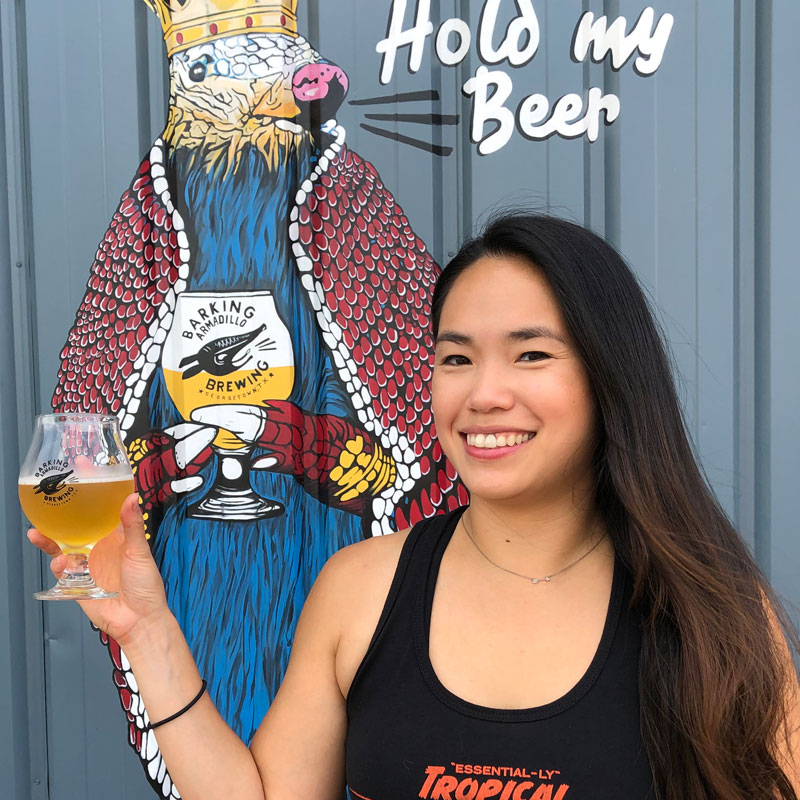If you want to know who Averie Swanson is, read her beer labels.
“I Am Because We Are.” “The Grace of Maybe.” “At the Still Point of the Turning World.” They point toward a philosophy that has guided her through nearly a decade in mixed-culture fermentation. Her newest venture, Keeping Together, isn’t just her brewery’s name, “it’s a mantra for individuals and our collective,” she says, each composed of unique parts that must be recognized and nurtured. And it “implies an ongoing effort,” she adds, to “create the compassionate, ecstatic reality that each person deserves to experience.”

From the pandemic’s disproportionate impact upon women, people of color, and gender-expansive folk to the stories of sexual abuse shared by Brienne Allan, the industry’s underrepresented repeat this invocation. For Swanson, “keeping together” means keeping a strong sense of self, as well. Quoting the T.S. Eliot poem for which she named a beer, “When you become really in touch with yourself, there is a still point in the ‘turning world’ where everything else is happening. If you practice it regularly, you can retreat back to this place of stillness and find sanctuary.”
Keeping it all together
Swanson opened her brewery with the goal of “increasing the collective empathy of the industry,” because changing a culture marked by experiences of sexism and racism starts from within. “In order to find empathy, one must be vulnerable,” she says, “and there is an element of introspection that requires.”
Yet the burden of change often falls upon the people most impacted, and the load gets heavy. Swanson is a Master Cicerone, one of just 19 people (three of whom are women) in the world who hold the highest standardized certification in beer. Earning it was a grueling, five-year process of relentless study and two failed attempts. At the same time, she was head brewer and part owner of Austin, Texas’ lauded Jester King Brewery, traveling the world representing the brand and educating people on mixed fermentation. But it left room for little else, and by 2018, her candle was burnt at both ends.
One week before earning Master certification, Swanson quit Jester King; four months later, her mother died. The following year, she moved to Chicago to open Keeping Together, and then the pandemic struck. The new chapter hasn’t been what she hoped, but she’s “happy with the response to the beer.” Besides, “we’re all moving forward in the world from a history that has brought us to that point,” she says, and learning from the journey requires fearless analysis of both yourself and the path you’ve traveled.

Women are taught to be all things to everyone, and this pressure is internalized, says Crystal Luxmore, one of North America’s leading beer journalists and co-founder of the Ontario-based Beer Sisters consultancy, through which she and sister Tara host education, training, and tasting events. Success in the beer industry typically takes hours and mileage making connections, and “because of the way we’re socialized, men tend to feel more freedom to do those things,” Luxmore says. “As a mom, I wouldn’t feel good if I was always on the road.”
Even before COVID-19, women spent three times as many hours as men on family and household care work; now it’s the equivalent of an extra full-time job. The World Economic Forum (WEF) finds the majority of global care work is unpaid, performed by “women and girls from socially disadvantaged groups.” In fact, “the gradual progress towards gender equality seen in recent decades could not only stall, but be reversed” by the pandemic, the WEF reports.
Luxmore suspects the unequal balance of care work (along with cultural bias) is behind female underrepresentation in the time-consuming task of homebrewing as well as in science, technology, engineering, and math (STEM) jobs overall. Worldwide, women constitute less than one-third of the STEM workforce; in the U.S., just 11.5% of them are women of color, and there isn’t even sufficient data on LGBTQIA+ representation.

“My family … instilled in me that I have to do something where I can support myself, and not depend on anyone,” says Amanda Trimm, co-owner with husband Jacob and friend Brian Cantu of Barking Armadillo Brewing in Georgetown, Texas. This drove nine years of education to achieve the pharmacy career she loves. “There’s a sense of accomplishment in what I do,” she says. “I see the interventions having a positive impact on people’s lives.”
Besides, they need the benefits in a nation where family support policies are virtually nonexistent. And they’re the lucky ones, having parents nearby to help with childcare, an expense to which the average American household allocates 25-50%-plus of its income. Still, balancing all this work gets grueling, and “eventually,” Trimm says, “something is going to have to give.”
Grab your bootstraps
Jester King brewery and restaurant now sprawls 165 acres of former ranchland, but when Swanson joined in 2013, it was still a pirate ship. She was one of just a few women on the volunteer crew, and when they started an apprenticeship program, “I knew I needed to do whatever I could to secure that position,” Swanson says.
Already working for free, she invested her own time and money into earning her Certified Beer Server, then Certified Cicerone, the first two levels of what is now a four-tiered certification system; along with her passionate testimony, it earned her a paid apprenticeship. From there, she moved straight to the Master (the third tier, Advanced Cicerone, wasn’t created until 2015). While Jester King covered the cost of her first two Master’s tests, all told, Swanson sunk hundreds of hours and an estimated $3,000-4,000 of her own earnings into her professional education.
As in higher education, unpaid labor is common in beer, a practice that deepens existing gender, racial, and class divides. Internships, for example, favor students and workers from affluent and predominantly white families: those who can most afford to work for free. Swanson financed her training through part-time work in Jester King’s taproom, along with side hustles making jewelry and vending vintage kitchenware. She acknowledges that “there are people [in the industry] who have worked just as hard, if not harder, than me and had a much harder time.”
Still, women of all backgrounds remain underrepresented in beer, and Swanson was aware of her differences each time a male colleague asked if she needed a hand. The job involved a lot of manual labor, and “I wasn’t the most physically confident person,” she says. “I learned how to use my body to make things happen so I didn’t have to ask for help. It was as much about proving to myself that I was worthy of being there as it was proving things to other people.”
While we tend to view foundational moments through the lens of the mind, our experience flows through the physical form. “The years leading up to passing the Master were a journey of increasing confidence in myself,” Swanson says. “I drew so much strength from becoming comfortable in my own body.” It fueled her ascension from volunteer to apprentice, brewer, and ultimately to co-owner and head brewer of world-renowned beer. She became educator and ambassador at festivals, collaborations, and conferences, and “every interaction was an opportunity to learn and share.”
But success had a bitter aftertaste. “The people I met didn’t necessarily go into an engagement with me thinking I knew as much as they did,” Swanson says. “It’s tokenization, and I’ve struggled with that a fair amount.”
An autoimmune disorder of the mind
Imposter syndrome, according to the American Psychological Association, is a psychological phenomenon wherein you doubt your own skills, abilities, and inherent worth, no matter how much you achieve or accomplish. For many, it’s an inner voice that whispers, “you’re not good enough, you don’t know anything, and one day, everyone is going to find out.” According to a study in the Journal of Behavioral Science, 70% of Americans experience it, from brewers to Fortune 100 executives. But it doesn’t impact everyone the same way. The difference is whether the culture contradicts or supports your negative inner monologue. If the system supports the voices in your head, is it really imposter syndrome?
“It’s a mind-fuck,” Swanson summarizes. “The organization of the industry as a whole reinforces a lot of the thoughts I feel. It’s like an autoimmune disorder of the mind, where [it] turns on you and begins decaying from within.”
However, reality doesn’t match that internal point of view: In addition to her credentials, Swanson started a successful beer label on her own amidst a global pandemic. Luxmore is an Advanced Cicerone and Prud’homme Beer Sommelier as well as a multi-award-winning journalist and editor of Growler Magazine.
Trimm built and maintains the brewery’s website, social media accounts, and digital marketing and coordinates special events, “all these things I had never done in my life,” she says. She keeps track of administrative and legal tasks, and oversees COVID-safety precautions. “I help with background things that are still important,” she says, “but no one sees those things.”
She’s also primary caregiver to the couple’s daughter and keeps their only steady paycheck coming through her full-time career as a Veteran’s Administration hospital pharmacist. Yet she’s quick to point out that she has no marketing degree, nor is she directly involved with brewing or operations.
While Luxmore says she’s never questioned her skills as a writer, “as a Cicerone and educator, I have,” she says. She feels vulnerable around technical subjects, because “I’ve never brewed at a brewery, but that’s not what a Cicerone is.” And sometimes even Swanson thinks, “Maybe this certification doesn’t actually mean shit.”
When doubts creep in, “I try to practice coming back and being really honest with myself about where those insecurities are coming from,” Swanson says. “I need to be willing to receive feedback and constantly be reflecting on who I am, how I’m interacting with people, and how I’m interacting with my craft.” There are times when this self-inquiry reveals real gaps in knowledge and skills.
But other times, it’s “imposter syndrome, [which] means internalizing the discrimination; I see myself as they see me now.” Swanson recalls festival attendees addressing questions about the beer she made to the man standing next to her as well as more overt attacks: “No, I don’t stir the mash with my vagina.”
“There’s a lot of unconscious sexism [in beer], and women don’t want to talk about it publicly,” Luxmore says, noting colleagues reluctant to go on record. Many fear repercussions, while others, consciously or not, downplay their experience. “I haven’t allowed really overt discrimination against myself,” Swanson says, pushing back with an “acute response.” But just because you don’t tolerate mistreatment doesn’t mean it isn’t happening.
When people discover she’s a Master Cicerone, dumbed-down conversations tend to suddenly elevate, and “it’s tokenization,” Swanson says. Conversely, “I became obsessed with trying to prove myself,” Luxmore says. “As a woman in beer [with] these qualifications, I want to know the answer to every question, or I feel inadequate, but that’s an unrealistic expectation.”
Unfinished business
“They say, between family, friends, and career, [you can] pick two,” Trimm says with a wan smile. “You’re always leaving something out.”
At Jester King, “I felt I had sacrificed a lot of my personal mental health and the health of my relationships,” Swanson says. While she battled fears about relinquishing her team and a good job, “I’m glad I left when I did, and was able to be present [with my mom.]” She pauses upon mentioning her late mother, gone amidst other loss.
“Some people there are still my friends. But there was some resentment toward me for leaving,” she says. “I felt like I had PTSD. I thought about it every day for like a year and a half. … I gave a lot to that place, and it’s hard to feel like there are people who don’t think I did.”
But “you can’t think about regrets,” Trimm says. “You have to just keep moving forward, and accept that it’s okay not to do everything perfectly or get everything done.”
Swanson admits that “I had a hard time pivoting between being a leader and a manager; it didn’t come naturally to me.” Still, people management wasn’t her goal, and she was reaching the limits of her learning.
In an industry defined by small business, ownership is often the only growth track, and it’s fraught with systemic challenges. “I know a lot of very talented women who have left craft beer in their early to mid-thirties,” Luxmore says, “because those positions at the top are so few and far between.” Solo female owners, she adds, are even more rare; in the U.S., they constitute just 3%. Meanwhile, less than 2% of brewery owners in the U.S. are of Asian descent, making Trimm among a handful of women within that category.
Besides, it’s not just about making more seats, but about “who gets to stay around the table,” Luxmore says, and whose voices are actually heard. She believes storytelling has the power to combat imposter syndrome; however, it will take a proactive effort to tell stories that go beyond the bylines, brewers, and old-boy’s networks that have dominated both breweries and beer journalism.
But it starts with the stories we tell ourselves, keeping hold of one’s unwavering inner truth. “It’s a practice of returning to self,” Swanson says. “At the end of the day, all the feelings I experience are happening within my sphere of consciousness. Whether it’s real or not, I’m the only one who can change those feelings.”
The Brewers Association and Craftbeer.com are proud to support content that fosters a more diverse and inclusive craft beer community. This post was selected by the North American Guild of Beer Guild Writers as part of its Diversity in Beer Writing Grant series. It receives additional support through a Diversity and Inclusion Grant by the Brewers Association Diversity Committee and Allagash Brewing Company.
The post The Still Point of the Turning World: Overcoming Imposter Syndrome appeared first on CraftBeer.com.
